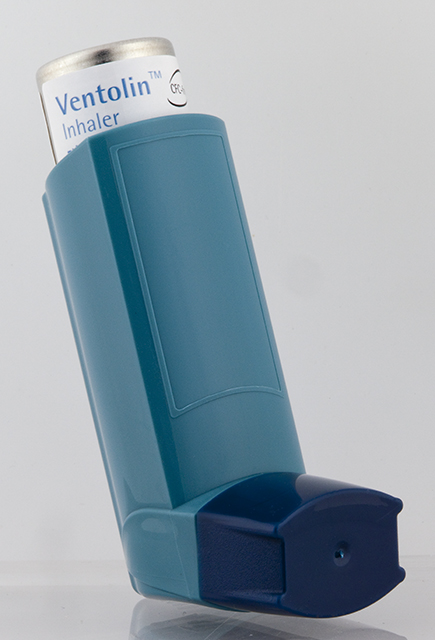Albuterol toxicity in Pets: Where’s your inhaler?
 Millions of people in the United States suffer from asthma. Many of these people have inhalers to use during an attack. These inhalers are composed of a small pressurized canister that contains a solution of asthma medicine fitted into a plastic casing that releases a precise dose of the medicine in an aerosol form. The medicine contained in many asthma inhalers is albuterol, a drug used to relax the muscles in the lungs and allow the air passages to open. The size and (we think) the smell of the inhalers make them very attractive and interesting to our dogs. Dogs are easily able to puncture the canister if they chew on it. Since the canister is pressurized, the entire contents are released instantly, resulting in almost certain overdose of the medication. In an overdose, these drugs affect both the muscles of the lungs as well as the muscles of the heart. The results are immediate, severe, and include the following:
Millions of people in the United States suffer from asthma. Many of these people have inhalers to use during an attack. These inhalers are composed of a small pressurized canister that contains a solution of asthma medicine fitted into a plastic casing that releases a precise dose of the medicine in an aerosol form. The medicine contained in many asthma inhalers is albuterol, a drug used to relax the muscles in the lungs and allow the air passages to open. The size and (we think) the smell of the inhalers make them very attractive and interesting to our dogs. Dogs are easily able to puncture the canister if they chew on it. Since the canister is pressurized, the entire contents are released instantly, resulting in almost certain overdose of the medication. In an overdose, these drugs affect both the muscles of the lungs as well as the muscles of the heart. The results are immediate, severe, and include the following:
- Increased heart rate
- Abnormal heart rhythms
- Red gums
- Increased respiratory rate / excessive panting
- Abnormal behavior (restlessness/agitation, hiding, tremors, shaking, lethargy, weakness, collapse)
- Low or high blood pressure
- Vomiting
- Severe changes in blood electrolytes (particularly potassium)
- Seizures
- Shock
- Acute death
If you know that your pet has bitten into an inhaler, you should seek care at the nearest emergency veterinary facility. Bring the inhaler and the original packaging if it is available, as well as any medications that your pet is currently taking. Do not induce vomiting at home.

Dogs suffering from albuterol toxicity will typically need to stay in the hospital for 12 – 48 hours. Treatment will include sedation, aggressive IV fluids, blood work (to monitor the electrolyte levels), drugs to slow the heart rate down, and heart and blood pressure monitoring. With prompt and appropriate treatment, albuterol toxicity is rarely fatal, although pets with heart conditions and pets on medications that interact poorly with albuterol are at higher risk for serious complications. Veterinary Medical Center of CNY’s Emergency veterinarians are available 24/7/365 to help you and your pet through these types of emergencies, but we will be just as happy if you can avoid them! Keep these and all other medications out of reach of your pets. Also avoid disposing of used canisters in trash cans that are accessible to pets. Used inhalers can still contain enough medication to be dangerous.
About Us
At Veterinary Medical Center of Central New York, we understand that the health of your pet is a top priority. In the case of an emergency or a condition requiring specialized care, we're here to treat your pet in our state-of-the-art, 24-hour Emergency and Critical Care Center.
